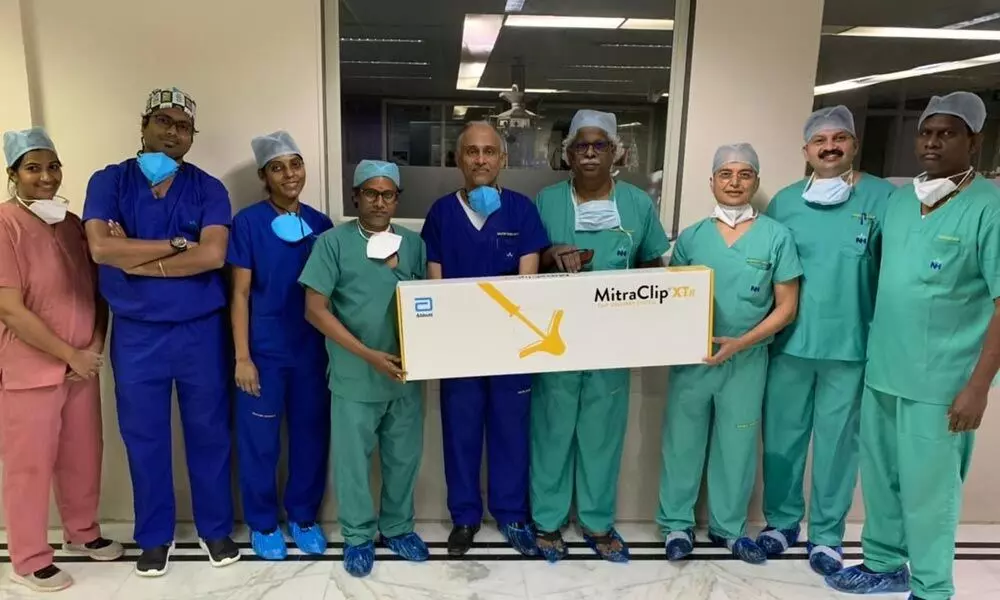Live
- They always want me to win, and now I feel lucky to have been offered a story like ‘Zebra’: Satyadev Kancharana
- ‘Democracy first, humanity first’: PM Modi in Guyana's parliament on two countries' similarities
- PKL Season 11: Telugu Titans register third straight win to top standings
- Is Pollution Contributing to Your COPD?
- NASA Unveils Underwater Robots for Exploring Jupiter's Moons
- Additional Central forces arrive in violence-hit Manipur
- AR Rahman and Saira Banu’s Divorce: Legal Insights into Common Issues in Bollywood Marriages
- 82.7 pc work completed in HPCL Rajasthan Refinery area: official
- Curfew relaxation extended in 5 Manipur districts on Friday
- Tab scam prompts Bengal govt to adopt caution over fund disbursement
Just In
Narayana Health City performs first MitraClip on 54-yr-old


Narayana Health City performs first MitraClip on 54-yr-old
Narayana Health City successfully performed the first MitraClip procedure on a 54-year-old patient suffering from severe mitral valve regurgitation.
Bengaluru: Narayana Health City successfully performed the first MitraClip procedure on a 54-year-old patient suffering from severe mitral valve regurgitation.
Severe mitral valve regurgitation is one of the leading causes of mortality in patients suffering from cardiovascular diseases. The latest treatment modality for disease, the MitraClip procedure gives a new ray of hope for patients. Narayana Health City in Bengaluru managed to successfully perform the procedure on a 54-year old patient from Assam on September 29.
Three months back, the patient began experiencing breathlessness on exertion. He also noticed that he was unable to keep up with his colleagues on his morning walk. His symptoms began to progress and he started experiencing breathlessness even at rest.
He visited a hospital in Assam and was told that his heart functioning was low especially his 'Left Ventricle Ejection Fraction' was below the normal range. Left ventricle ejection fraction is the percentage of blood that is pumped out of the left ventricle with each heartbeat. The ideal LV ejection fraction should be within the range of 50 to 70 per cent, however, in his case, it was just 25 per cent. Doctors at the hospital also diagnosed that he had severe leakage of the mitral valve(Severe Mitral Regurgitation).
It is a condition where the valve responsible for the prevention of blood from flowing back into the left atrium is leaky. In this case, the blood does not flow into the aorta in the normal way, causing the heart to work harder and eventually culminating in heart failure.
Doctors there advised him to get surgery and he decided to come to Narayana Health City, Bangalore to get a second opinion on his case.
The patient was immediately admitted to Narayana Health City and the team of doctors from Cardiac Sciences evaluated the patient in detail. A coronary angiogram revealed no blocks in the heart but his ECG made him ineligible for Cardiac Resynchronization Therapy. At this stage, doctors began the think about other alternative treatments and began considering MitraClip as a solution.
Headed by Dr Satish Govind, Head of Non-Invasive Cardiology, Narayana Health City, the team of doctors conducted a 2D Echo Doppler assessment to confirm the eligibility of the patient for MitraClip. "In this procedure, the mitral valve of the patient was accessed using a thin tube called a catheter that is guided through a vein in the leg and a small clip is implanted in the mitral valve. The implant clips the two leaflets of the mitral valve and reduces the leakage thereby restoring the normal blood flow through the heart." said the hospital in a press release.
With the consent of the patient, the team of Senior Interventional Cardiologists consisting of Dr Uday B Khanolkar, Sr Consultant – Interventional Cardiology, Dr Bagirath Raghuraman, Sr Consultant – Interventional Cardiology and Heart Failure and Dr Sanjay Mehrotra, Sr Consultant – Interventional Cardiology successfully performed the procedure.
"The case of this patient is a unique one as owing to his symptoms of extreme breathlessness despite maximum medications and not eligible for CRT, we had to deliberate extensively before finalising the apt one, ie, MitraClip. MitraClip has been proved to offer a significant reduction in mitral regurgitation. Further, it does not call for the surgical opening of the chest and temporarily stopping the heart. It is minimally invasive which means fewer possibilities of blood loss or scars and shorter hospital stay.", said Dr Uday B Khanolkar, Sr Consultant, Interventional Cardiology Narayana Health City.
Within just 6 hours, the patient recovered after the surgery and showed significant improvement in his symptoms. A post-procedural echo also revealed only mild mitral regurgitation.

© 2024 Hyderabad Media House Limited/The Hans India. All rights reserved. Powered by hocalwire.com






